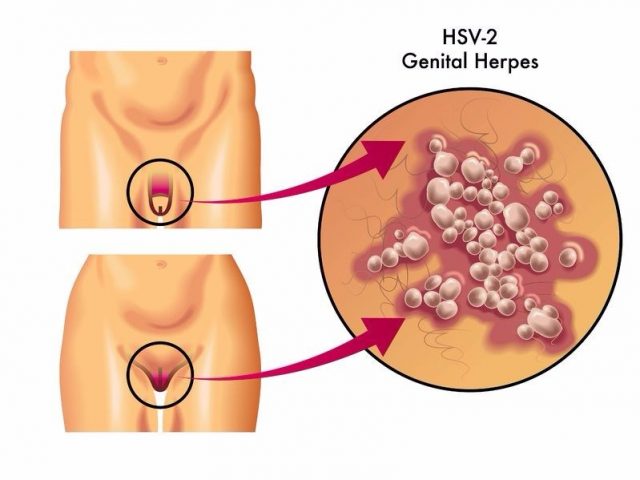Most women around the world are prone to sexually transmitted diseases.[1]

Unprotected sex happens to be one of the most important contributing factors. While using protective measures is one of the most common ways to treat it, it doesn’t always work.
Genital herpes, for instance, is one of the most common sexually transmitted diseases affecting both women and men. Most women are prone to it, and it takes a serious toll on women’s health.
What is genital herpes?
As stated above, genital herpes is a sexually transmitted disease, but this is responsible for causing herpetic sores, which can show extreme measures.[2]
The sores may eventually turn into blisters, thereby aggravating the problem. While the blisters may appear to be unproblematic, it will eventually cause one when the blisters burst open and ooze out the liquids. People between the age of 14 to 49 are the most prone to STD. But, studies have shown that around 16% of them are already suffering from STD.
What are the causes of genital herpes?
Herpes is caused by herpes simplex virus and is often categorized into two categories – HSV-1 (cold sores) and HSV-2 (genital herpes).[3]
The virus infects your body through the mucous membranes, which is present on the outer lining of the body. These are usually present around the genitals, mouth, and nose.
If the virus stays here for a long time, they eventually transform themselves into cells and start staying in the nerve cells of the pelvis.[4] With time, these will continue to multiply and outgrow in number, thereby complicating it.
The viruses usually infect the body through semen, saliva, and vaginal infections.

Symptoms of genital herpes that you need to watch for
Once the blisters begin to appear, know that it is an outbreak. The virus outbreak will happen within two days of exposure to the virus. However, in some people, the outbreak may take up to 30 days too.
The outbreak symptoms in males include the appearance of blisters around scrotum, buttocks, and penis. However, it may vary for women as the outbreak happens around buttocks, vagina, and anus.[5]
However, there are common symptoms that may affect both men and women.
- The appearance of blisters around the face, lips, and mouth, and all the areas that have come in contact with the infected parts.
- Swollen glands are thereby taking away the ability of lymph glands to fight off the infections and inflammation across the body.
- Ulcerated blisters, forming the shape of open sores, thereby increasing the risk of blisters.
- The infected area will begin itching, and scratching it would lead to oozing fluids, thereby causing a lot of problems.
- Frequent outbreaks.
- Fever, headache, and body aches.
Women suffering from genital herpes can transfer it to their babies too.[6] Thus, babies prone to herpes will show ulcers around their face and body. But the complications arise for babies who suffer from genital herpes as it increases the risk of brain damage, blindness, and even death.
Pregnant ladies need to consult the doctor if they suffer from genital herpes to protect the baby. The easiest way to prevent the baby from being infected is to avoid normal delivery and opt for cesarean one.[7]
Genital Herpes Diagnosis
A visual examination will eventually give your doctor the idea of whether or not you are suffering from genital herpes.[8] Often the doctor may conduct a laboratory test only to be sure of genital herpes.
A blood test will eventually give the idea of infection even before the outbreak. Thus, if you have been noticing the signs and symptoms of herpes, you need to schedule an appointment with your doctor as soon as possible.
Treatment
Depending on the frequency and severity of the outbreak, the doctor may prescribe a particular treatment. The treatment is aimed at lowering the number of outbreaks and not completely curing it.
Some of the prominent conditions under which the virus can be treated include entirely the following.
- Medicines
Antiviral medicines are aimed at healing the sores and reducing the pain. Medicines may further reduce the tingling sensation too. People who have frequent breakouts are prescribed the antiviral medicines to ensure a faster recovery.
- Home Care
Taking proper care at home can be one of the best ways to get rid of the virus. You should prefer to showering with warm water and keep the infected area clean to prevent breakouts. A loose cotton clothing can help to keep the respective area clean, so make sure to follow it.[9]
What if I have genital herpes and I am pregnant?
People suffering from STDs are often concerned about the baby’s health. If you have a frequent vaginal outbreak, you are the most prone to transfer the infection to your child via normal vaginal delivery. You need to consult your doctor if you have been suffering from genital herpes.[10]
The doctor will be responsible for finding out the possible cures of genital herpes. Depending on your condition, the doctor may recommend pregnancy-safe treatment to find the best remedy for healthy baby delivery. Cesarean delivery can be one of the best ways to protect the child from genital herpes.
Unsafe sex is one of the common reasons for genital herpes. Thus, you should prefer following safe sex to prevent the virus from spreading.
Genital herpes cannot be cured at once, but it can surely be managed.[11] Thus, you must see your doctor and prevent coming in close contact with anything that can increase the chances of an outbreak.
[1] https://www.ncbi.nlm.nih.gov/pmc/articles/PMC5177552/
[2] Smith J S, Robinson N J. Age-specific prevalence of infection with herpes simplex virus types 2 and 1: a global review. J Infect Dis. 2002;186 01:S3–S28. [PubMed] [Google Scholar]
[3] Stevens J G, Cook M L. Latent herpes simplex virus in spinal ganglia of mice. Science. 1971;173:843–845. [PubMed] [Google Scholar]
[4] Rand K H, Hoon E F, Massey J K. et al.Daily stress and recurrence of genital herpes. Arch Intern Med. 1990;150:1889–1893. [PubMed] [Google Scholar]
[5] https://www.ncbi.nlm.nih.gov/books/NBK525769/
[6] Bennedetti J, Corey L, Ashley R. Recurrence rates in genital herpes after symptomatic first-episode infection. Ann Intern Med. 1994;121:847–854. [PubMed] [Google Scholar]
[7] https://www.ncbi.nlm.nih.gov/pubmed/27281837
[8] Engelberg R, Carrell D, Krantz E. et al.Natural history of genital herpes simplex virus type 1 infection. Sex Transm Dis. 2003;30:174–177. [PubMed] [Google Scholar]
[9] Hofstetter A M, Rosenthal L, Stanberry L R. Current thinking on herpes genitalis. Curr Opin Infect Dis. 2014;27:75–83. [PubMed] [Google Scholar]

